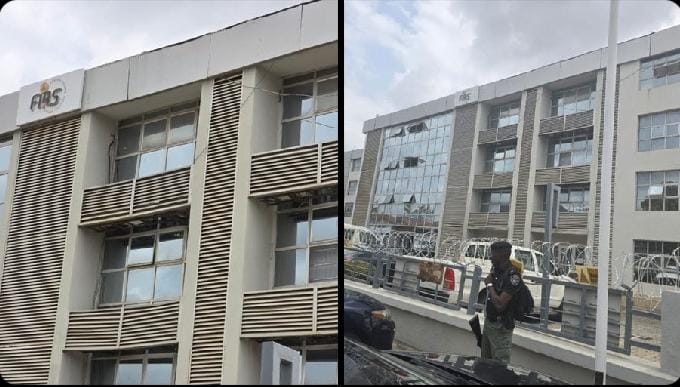the Federal Capital Territory Administration (FCTA) has sealed the Federal Inland Revenue Service (FIRS) office in Zone 5, Abuja, citing a staggering 25-year failure to pay ground rent. This dramatic action, executed on Monday, forms part of a sweeping enforcement campaign targeting 4,794 properties across the Federal Capital Territory (FCT) for non-payment of ground rent, some debts stretching back as far as 43 years. The closure of the FIRS office, a key government institution responsible for tax collection, has sparked widespread discussion and underscores the FCTA’s resolve to enforce compliance with the Land Use Act.
A Sweeping Crackdown on Defaulters
The FCTA’s enforcement exercise, which began in earnest this week, is aimed at reclaiming ownership of properties whose titles have been revoked due to unpaid ground rent. The targeted properties span some of Abuja’s most prestigious districts, including Central Area, Garki, Wuse, Asokoro, Maitama, and Guzape. Among the high-profile defaulters is the FIRS office in Zone 5, which, according to reports has not paid its ground rent for a quarter of a century. Other notable properties sealed include an Access Bank branch in Wuse, highlighting the indiscriminate nature of the FCTA’s operation, which spares neither government agencies nor private institutions.
The FCTA’s actions are grounded in the Land Use Act, which vests the FCT Minister with the authority to revoke titles for non-compliance with ground rent payments. These payments, an annual obligation for property owners in the FCT, are critical for maintaining land titles and supporting the administration’s urban development initiatives. The scale of the crackdown is staggering: 8,375 properties owe a combined debt of nearly ₦7 billion, with 4,794 titles already revoked. The FCTA has made it clear that defaulters who fail to settle their debts risk permanent loss of their properties to the government.
A Long-Standing Issue Comes to a Head
The issue of unpaid ground rent in Abuja is not new, but the FCTA’s aggressive enforcement marks a significant escalation. For years, property owners—ranging from government agencies to private businesses and individuals—have neglected their obligations, accumulating debts that, in some cases, date back to the early 1980s. The FCTA had previously issued warnings, including a 21-day grace period for some defaulters to clear their arrears. However, with many failing to comply, the administration has now resorted to sealing properties to enforce compliance and recover the massive debts.
The sealing of the FIRS office is particularly striking, given its role as Nigeria’s primary tax collection agency. The irony of a tax authority failing to meet its own financial obligations has not been lost on observers, with social media platforms like X buzzing with reactions. Posts on X described the FCTA’s move as a “bold statement,” with some users questioning how an agency tasked with enforcing tax compliance could itself fall foul of financial regulations. Others praised the FCTA for its impartiality, noting that no entity, no matter how powerful, is above the law.
The Mechanics of the Enforcement
The FCTA’s enforcement process is methodical and legally backed. Once a property is identified as being in default, the FCTA issues a notice of revocation, giving the owner a limited window to settle the outstanding debt. If the debt remains unpaid, the administration proceeds to seal the property, effectively barring access and signaling its intent to reclaim ownership. In the case of the FIRS office, the sealing was carried out swiftly, with FCTA officials locking the premises and affixing notices to the building.
The broader campaign has seen similar actions across Abuja’s upscale districts. Properties in Central Area, known for housing government offices and corporate headquarters, and Maitama, a haven for the city’s elite, have been among those targeted. The FCTA’s message is clear: pay up or lose your property. For many defaulters, the sealing of their buildings serves as a wake-up call, prompting urgent efforts to settle debts that have accumulated over decades.
Economic and Social Implications
The FCTA’s crackdown comes at a time when Nigeria is grappling with economic challenges, including inflation and a strained fiscal environment. The ₦7 billion in outstanding ground rent represents a significant revenue stream for the FCT, which could be used to fund infrastructure, public services, and urban development projects. By enforcing compliance, the FCTA aims to bolster its financial position and ensure that all property owners contribute to the city’s growth.
However, the move has sparked debate about its broader implications. For businesses like Access Bank, the sealing of branches could disrupt operations and affect customer service. For government agencies like the FIRS, the closure of offices could hamper critical functions, such as tax collection and administration. On X, some users expressed concern that the enforcement could deter investment in Abuja’s real estate market, while others argued that it was a necessary step to instill discipline and accountability.
What’s Next?
As the FCTA presses forward with its campaign, all eyes will be on how defaulters respond. Will the sealing of high-profile properties like the FIRS office spur compliance, or will it lead to legal battles and public backlash? For now, the FCTA appears resolute, with officials vowing to continue sealing properties until the ₦7 billion debt is recovered. For property owners in Abuja, the message is unmistakable: pay your ground rent, or risk losing your stake in Nigeria’s capital city.
Join our Whatsapp channel to stay updated always!


